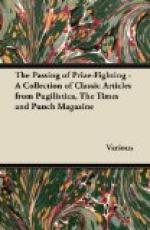But ought any Government to encourage this sort of thing?
* * * * *
[Illustration: Dancing Man (at Galleries of New Primitive Art Society). “ONE WOULD HAVE THOUGHT, WITH SUCH A GOOD FLOOR, THEY MIGHT HAVE PUT UP SOME BETTER PICTURES.”]
* * * * *
OUR BOOKING-OFFICE.
(By Mr. Punch’s Staff of Learned Clerks.)
Following the iconoclastic spirit of the age, Mr. BARRY PAIN has essayed in The Death of Maurice (SKEFFINGTON) the revolutionary experiment of a murder mystery tale that does not contain (a) a love interest, (b) a wrongly suspected hero, (c) a baffled inspector, (d) an amateur, but inspired, detective. It would be a grateful task to add that the result proves the superfluity of these time-worn accessories. But the cold fact is that, to me at least, the proof went the other way. From the first I was painfully aware of a lack of snap about the whole business, and I am more than suspicious that the author himself may have shared my unwilling indifference. Maurice was an artistic bachelor, a landowner, a manufacturer of jam, a twin (with a bogie gift of knowing at any moment the relative position of his other half, which might have been worked for far more effect than is actually obtained from it), and a reputation of making enemies. He had also an unusual neighbour, in the person of a young woman whose unconventionality led her to perambulate the common at midnight, playing the first bars of Solveig’s Song upon the flute. One night, at the close of the first chapter, a gun was heard. But you are wrong to suppose (however naturally) that the flute-player was the victim. It was Maurice. And of course the problem was, who did it. I have told you my own experience of the working out; nothing written by Mr. BARRY PAIN can ever be really dull, just as no story starting with a mysterious murder can lack a certain intrigue; but the fact remains that my wish, heroically resisted, to look on to the last chapter was prompted more often by impatience than by any compelling curiosity. Others may be happier.
* * * * *
The author of A Journal of Small Things has done much to make us understand the sufferings of stricken France and the more intimate sorrows of war. Chill Hours (MELROSE) deals with that dark period before the end, when, to some, it seemed all but certain that the will to victory must fail. Of the three parts of this gracious little book the first consists of six sketches of life behind the lines, life both gentle and simple, as affected by war. “Odette in Pink Taffeta,” an episode of bereavement, is in particular exquisitely visualised. “Their Places” and “The Second Hay” treat, with a quiet intensity of conviction, of the absolutely deadening absorption, by overwork and anxiety, of




